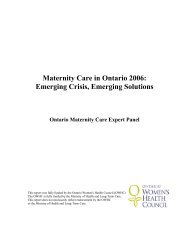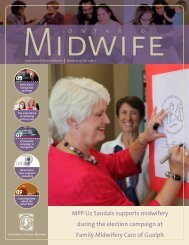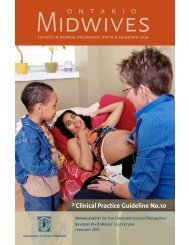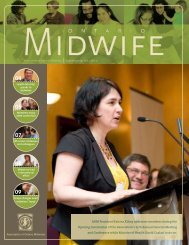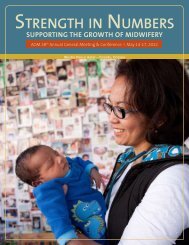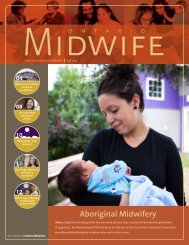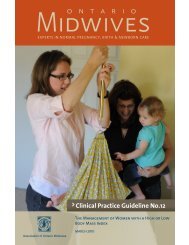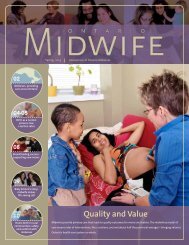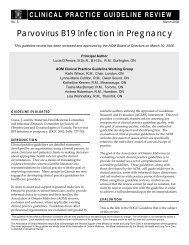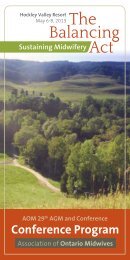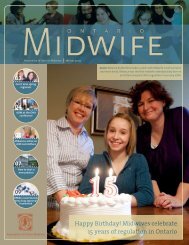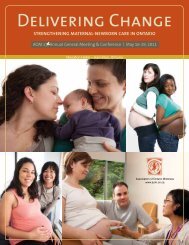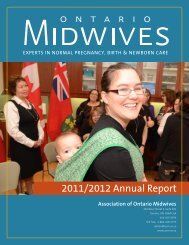Fall 2010 - Association of Ontario Midwives
Fall 2010 - Association of Ontario Midwives
Fall 2010 - Association of Ontario Midwives
- No tags were found...
You also want an ePaper? Increase the reach of your titles
YUMPU automatically turns print PDFs into web optimized ePapers that Google loves.
<strong>Midwives</strong>, nurses, physicians and hospital administrators cement positive interpr<strong>of</strong>essional relationships when working on projects such as Baby-friendly certification.Interpr<strong>of</strong>essional team leads to Baby-friendly successSt. Joseph’s Healthcare Hamiltonhas recently had its Baby-friendlyHospital status re-designated thanksto interpr<strong>of</strong>essoinal collaborationand education. This project has led toincreased communication and educationbetween physicians, nurses, midwivesand lactation consultants.Despite having first become aBaby-friendly Hospital in 2003, gettingre-designated was not a walk in thepark, according toShirin Aghili, RM, headmidwife at St. Joseph’s. “Being partBecause many<strong>of</strong> the wholemothers coming intointerpr<strong>of</strong>essionalSt. Joseph’s are fromcommunities thatmeeting processroutinely unnecessarily and being the headsupplement withmidwife is hugelyformula at birth untileye-opening,”the breast milk comesin, it was quite easy for - Shirin Aghili, RM,rates <strong>of</strong> breastfeedingHead Midwifeinitiation to slip belowdesirable levels.In addition, St. Joseph’snursery is in some ways working againstit. Though categorized as a level onenursery, Aghili says it is capable and <strong>of</strong>tendoes handle more complicated cases andinfants with more serious issues who mayrequire supplementation in the initialdays due to medical issues.“There was a need for regroupingand re-teaching the hospital staff,”Aghili said with regard to getting thedesignation back. For example, properdocumentation for babies coming intothe nursery is essential to show caseswhere supplementation is needed, suchas hyperbilirubinemia.“The hospital has implemented newforms that say the baby must be on thebreast for 14 minutes while in the deliveryroom,” Aghili said. “Skin to skin is highlyencouraged.”Patients also needed someeducation. For example, ifpatients indicate they planto formula-feed when theyregister at the hospital, theyare told not to be disappointedif staff ask again or promotebreastfeeding.In addition to encouragingthose who would normallysupplement at birth until themilk comes in to breastfeedearlier on and be patient withthe process, Aghili said theyalso recommend patients takeadvantage <strong>of</strong> on-call help as needed.Aghili said the process was spearheadedby a very dedicated Dr. Tamar Packer,Medical Director <strong>of</strong> Newborn Services atSt. Joseph’s, but also successful thanks toa great interpr<strong>of</strong>essional environment.“The hospital is so proud they havemidwives (because they) know about ourgood breastfeeding rates,” she said.As head midwife, Aghili sits onmultidisciplinary steering committeesfor maternal, child and newborn health.Another midwife at her Hamilton practicesits on the regional lactation committee.The meetings provide a great avenuefor discussion and troubleshootingamong pr<strong>of</strong>essional colleagues who havedifferent backgrounds and skill sets.“Being part <strong>of</strong> the whole meeting processand being the head midwife is hugelyeye-opening,” she said. “It allows us, asmidwives, to see what an institutionhas to face in order to increase thebreastfeeding rates. It is so easy tojust say ‘everybody breastfeed’ but toactually put it into practice and put it intoeducation is challenging.”Another positive outcome from theprocess was that the hospital’s lactationconsultant approached Aghili and askedif the practice would like additionalbreastfeeding education for its studentsand new registrants. Because theHamilton <strong>Midwives</strong> takes on manystudents, Aghili said they now routinelysend students to the breastfeeding clinic– which is available to clients throughself-referral seven days a week – foradditional breastfeeding education.The hospital’s Baby-friendly designation isreassessed every five years.www.aom.on.ca05



